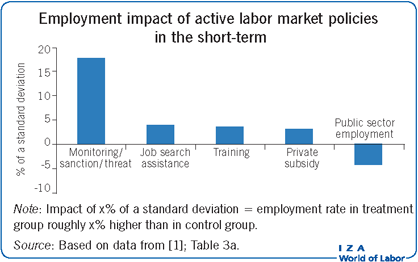Elevator pitch
In many countries, reducing unemployment is among the most important policy goals. In this context, monitoring job search by the unemployed and providing job search assistance can play a crucial role. However, more and more stringent monitoring and sanctions are not a panacea. Policymakers must consider possible downsides, such as unemployed people accepting less stable and lower-paying jobs. Tying “moderate” monitoring to job search assistance may be the essential ingredient to make this approach successful.
Key findings
Pros
Job search assistance and monitoring increases job finding rates for the unemployed.
Basic job search monitoring can be enough to increase the job finding rate.
Job search monitoring is cheap to implement compared to other active labor market policies such as job training.
Job search assistance can be more effective for job-seekers with worse job prospects or with too narrow job search criteria.
Cons
Job search assistance and monitoring increases the competition for jobs, and therefore lowers the job finding rate for unemployed job-seekers who do not participate in the program.
Reinforced job search monitoring does not increase job finding.
Sanctions for insufficient job search can push the unemployed to take lower quality jobs.
Reinforced job search monitoring can cause some unemployed workers to give up searching and begin receiving disability benefits instead.
